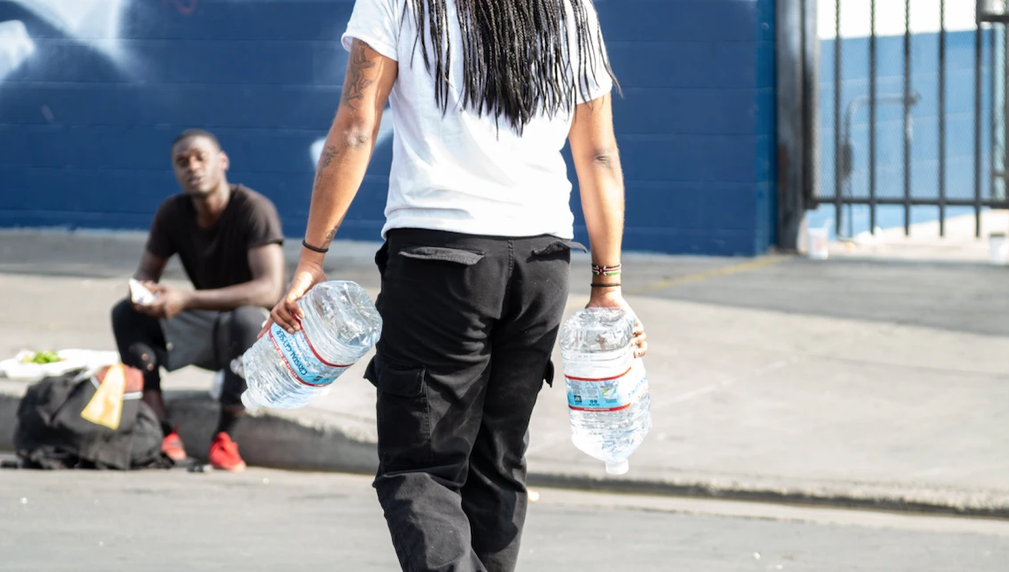Establishing a resource hub to keep unhoused Angelenos hydrated during extreme heat
Water Drop LA aims to provide backbone infrastructure, potable water, and a capacity-building workshop series to the network of grassroots, homeless-serving mutual aid organizations in LA County. Many such organizations spend a substantial portion of limited budgets purchasing critical resources from retailers that could be provided for free if they could be received and stored. Water Drop aims to fill this gap by hosting a shared resource hub to secure and receive donations, purchasing water at a lower cost, and hosting a shared space.

What is the primary issue area that your application will impact?
Affordable housing and homelessness
In what stage of innovation is this project, program, or initiative?
Expand existing project, program, or initiative (expanding and continuing ongoing, successful work)
What is your understanding of the issue that you are seeking to address?
ens of thousands of unhoused Angelenos lack access to the most fundamental basic necessity: water. Water insecurity means the inability to properly clean wounds, increased risk of dehydration, heatstroke, and heat exhaustion, exacerbated mental health concerns, significant time expended traveling to water sources, forced engagement in criminalized activities, and dependence on over-priced water from convenience stores. These hazards have contributed to neighborhoods like Skid Row having twice the County average emergency room visits for heat-related illnesses and the fact that unhoused Angelenos made up 42% of those who died from heat-related illnesses in 2022 when they make up 1% of LA’s population. Voluntary organizations across LA are a key piece of the region’s climate resilience as they spend countless hours fundraising, purchasing supplies, forming relationships, and distributing goods to their unhoused neighbors. However, current efforts fall short of the overwhelming need.
Describe the project, program, or initiative this grant will support to address the issue.
A core component of Water Drop LA’s model is our partner water program. On a bi-annual basis, we purchase water to provide to up to 20 grassroots organizations serving water-insecure, unhoused communities across LA County. This allows us to extend our reach to residents across LA County by partnering with organizations that know their specific communities’ needs. This initiative aligns with our core belief that we should never adopt a competitive relationship with other service providers; rather, we should view the network of service providers across LA County as partners in our work. Unfortunately, the lack of a brick-and-mortar site prevents Water Drop LA from receiving and distributing large amounts of water consistently. This funding would allow us to expand our partner program, and therefore our reach across LA County, by establishing a shared resource hub where we could store donated water, furniture, hygiene kits, and other basic necessities to then distribute to smaller organizations. In doing so, we would be erecting desperately needed water infrastructure that is accessible to LA’s small, grassroots nonprofits that do not have the budget to purchase water for their distributions on their own. Additionally, the space would also be available at no cost to the network to host workshops by and for mutual aid organizations to facilitate trainings on de-escalation, first aid, housing navigation, and sweep defense.
Describe how Los Angeles County will be different if your work is successful.
If our work is successful, LA County’s unsheltered and low-income communities will benefit from an increase in access to clean drinking water. This, in turn, will decrease the number of preventable heat-related illnesses and deaths that have been on the rise as temperatures increase across the region due to climate change. By establishing a robust, decentralized, and low-barrier water distribution system and resource center, we will be able to increase the amount of water available to other organizations, allowing them to focus their capacity and funds on other vital programs.
Furthermore, we expect our efforts to lead to a movement of organizers who are better equipped to address issues in their communities. Having a shared location will also increase collaboration and coordination between organizations across LA while facilitating peer learning and support. These efforts will increase the capacity of all participating organizations benefiting from the resource hub.
What evidence do you have that this project, program, or initiative is or will be successful, and how will you define and measure success?
We measure our impact through informal interviews with unhoused residents, the strength of our partnerships, and the strength of our volunteer base. We conduct informal interviews during regular check-ins with unhoused community members in our service area. Based on an internal evaluation of our efforts, most participants stated that they received most or all of their weekly water from mobile distributions like ours. Many residents have expressed the essentiality of receiving water and electrolytes, particularly during extreme heat events. In our 3rd year of operation (July 2022-2023) we donated 37 pallets or 9171 gallons of water to organizations across LA and we currently maintain regular contact with 20 partners. During the same period, we engaged 750 volunteers for a total of 5610 volunteer hours. 64% of volunteers were new engagements and 271 individuals returned to volunteer with Water Drop LA at least once, demonstrating our ability to build community and sustain engagement.
Approximately how many people will be impacted by this project, program, or initiative?
Direct Impact: 15,000.0
Indirect Impact: 15,000.0